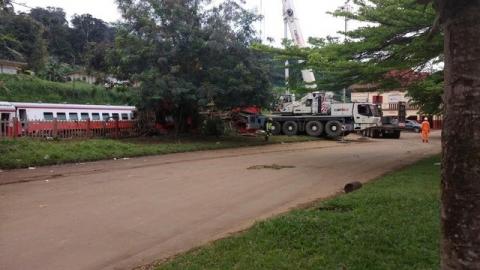Advertisement
Cameroon's Camrail responsible for deadly train accident: expert report
YAOUNDE (Reuters) - Cameroon's Camrail bears "total and entire responsibility" for a passenger train accident that killed at least 79 people last year, concluded one of the four experts reports commissioned by the government for an official inquiry that was seen by Reuters on Thursday.
The packed train operated by Camrail, a unit of French industrial group Bollore, derailed in the town of Eseka on Oct. 21 en route from the capital Yaounde to the central African country's port city of Douala.
Soon after, President Paul Biya ordered an inquiry, including reports by four different teams of experts, to establish the cause of the accident. Reuters was unable to determine when the government will release its findings, which are expected to draw upon on information from each of the four reports.
One of the experts reports seen by Reuters outlined a chain of technical and administrative shortcomings by Camrail that it said contributed to the accident.
"There was no force majeure, and we have not noted an external cause either. The catastrophe is therefore totally attributable to Camrail and its managers at the highest summit of the hierarchy," the report stated.
When asked for a comment about the report, a spokesman for Bollore's Camrail unit said on Thursday: "We respect and continue to respect the confidential nature of the inquiry."
Contacted late on Thursday, Cameroon's government spokesman was not immediately available to comment on the report.
In the document, whose conclusions may not necessarily be reflected in the government's final report, railway expert Benoit Essiga wrote that Camrail had disregarded passenger capacity and weight limits as it sought to accommodate increased demand from travelers.
The train had not been properly inspected and 13 of its 17 carriages had malfunctioning braking systems, the report found. It added that Camrail's management had disregarded complaints from personnel regarding technical defects.
Reuters could not independently confirm the assertions contained in the report.
Eric Melet, chairman of Bollore Africa Railways, acknowledged to Reuters in October that the train had been traveling at about twice its normal speed when it derailed. He also said carriages were added before the train's departure with the permission of the authorities, but denied it was overloaded.
Speaking to Reuters, Essiga confirmed the authenticity of the document.
In the immediate aftermath of the crash, the government gave an initial death toll of 79 with more than 400 others injured. Though that figure had been expected to rise, no final figure was given.
Victims of a rail crash and families of the dead filed a lawsuit against Camrail and Bollore in November, accusing them of negligence and involuntary manslaughter.
Spokesmen for Camrail and Bollore declined to comment on the lawsuit at the time, saying they were awaiting the results of the investigations.
(Additional reporting by Gwénaëlle Barzic and Gilles Guillaume in Paris; Writing by Joe Bavier; Editing by Alison Williams)



















Add new comment